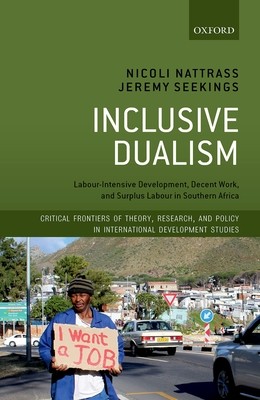
- We will send in 10–14 business days.
- Author: Nicoli Nattrass
- Publisher: Oxford University Press, USA
- ISBN-10: 0198841469
- ISBN-13: 9780198841463
- Format: 15.2 x 23.6 x 2 cm, hardcover
- Language: English
- SAVE -10% with code: EXTRA
Reviews
Description
W. Arthur Lewis, the founding father of development economics, proposed a dualist model of economic development in which 'surplus' (predominantly under-employed) labour shifted from lower to higher productivity work. In practice, historically, this meant that labour was initially drawn out of subsistence agriculture into low-wage, labour-intensive manufacturing, including in clothing production, before shifting into higher-wage work. This development strategy has become unfashionable. The International Labour Organisation (ILO) worries that low-wage, labour-intensive industry promises little more than an impoverishing 'race to the bottom'. Inclusive Dualism: Labour-intensive Development, Decent Work, and Surplus Labour in Southern Africa argues that decent work fundamentalism, that is the promotion of higher wages and labour productivity at the cost of lower-wage job destruction, is a utopian vision with potentially dystopic consequences for countries with high open unemployment,
many of which are in Southern Africa.
EXTRA 10 % discount with code: EXTRA
The promotion ends in 19d.14:08:17
The discount code is valid when purchasing from 10 €. Discounts do not stack.
- Author: Nicoli Nattrass
- Publisher: Oxford University Press, USA
- ISBN-10: 0198841469
- ISBN-13: 9780198841463
- Format: 15.2 x 23.6 x 2 cm, hardcover
- Language: English English
W. Arthur Lewis, the founding father of development economics, proposed a dualist model of economic development in which 'surplus' (predominantly under-employed) labour shifted from lower to higher productivity work. In practice, historically, this meant that labour was initially drawn out of subsistence agriculture into low-wage, labour-intensive manufacturing, including in clothing production, before shifting into higher-wage work. This development strategy has become unfashionable. The International Labour Organisation (ILO) worries that low-wage, labour-intensive industry promises little more than an impoverishing 'race to the bottom'. Inclusive Dualism: Labour-intensive Development, Decent Work, and Surplus Labour in Southern Africa argues that decent work fundamentalism, that is the promotion of higher wages and labour productivity at the cost of lower-wage job destruction, is a utopian vision with potentially dystopic consequences for countries with high open unemployment,
many of which are in Southern Africa.


Reviews